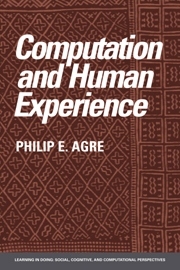Book contents
- Frontmatter
- Contents
- Preface
- 1 Introduction
- 2 Metaphor in practice
- 3 Machinery and dynamics
- 4 Abstraction and implementation
- 5 The digital abstraction
- 6 Dependency maintenance
- 7 Rule system
- 8 Planning and improvisation
- 9 Running arguments
- 10 Experiments with running arguments
- 11 Representation and indexicality
- 12 Deictic representation
- 13 Pengi
- 14 Conclusion
- Notes
- References
- Author index
- Subject index
14 - Conclusion
Published online by Cambridge University Press: 07 December 2009
- Frontmatter
- Contents
- Preface
- 1 Introduction
- 2 Metaphor in practice
- 3 Machinery and dynamics
- 4 Abstraction and implementation
- 5 The digital abstraction
- 6 Dependency maintenance
- 7 Rule system
- 8 Planning and improvisation
- 9 Running arguments
- 10 Experiments with running arguments
- 11 Representation and indexicality
- 12 Deictic representation
- 13 Pengi
- 14 Conclusion
- Notes
- References
- Author index
- Subject index
Summary
Discourse and practice
My argument throughout has turned on an analysis of certain metaphors underlying AI research. This perspective, while limited, provides one set of tools for a critical technical practice. I hope to have conveyed a concrete sense of the role of critical self-awareness in technical work: not just as a separate activity of scholars and critics, but also as an integral part of a technical practitioner's everyday work. By attending to the metaphors of a field, I have argued, it becomes possible to make greater sense of the practical logic of technical work. Metaphors are not misleading or illogical; they are simply part of life. What misleads, rather, is the misunderstanding of the role of metaphor in technical practice. Any practice that loses track of the figurative nature of its language loses consciousness of itself. As a consequence, it becomes incapable of performing the feats of self-diagnosis that become necessary as old ideas reach their limits and call out for new ones to take their place. No finite procedure can make this cycle of diagnosis and revision wholly routine, but articulated theories of discourses and practices can certainly help us to avoid some of the more straightforward impasses.
Perhaps “theories” is not the right word, though, since the effective instrument of critical work is not abstract theorization; rather it is the practitioner's own cultivated awareness of language and ways it is used. The analysis of mentalism, for example, has demonstrated how a generative metaphor can distribute itself across the whole of a discourse.
Information
- Type
- Chapter
- Information
- Computation and Human Experience , pp. 302 - 315Publisher: Cambridge University PressPrint publication year: 1997
